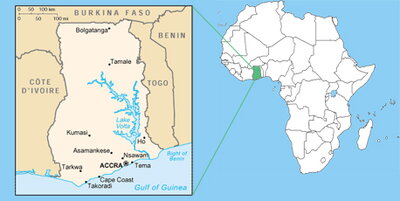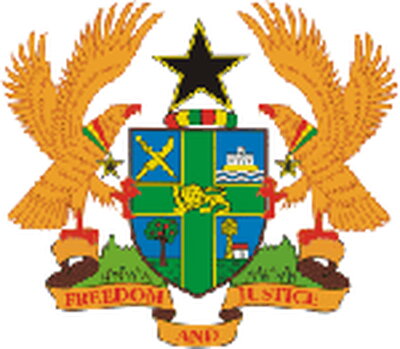

Region: Western Africa
Quick Facts:
- Population: 21.8 million
- Capital: Accra
- Area: 92,098 sq miles (slightly smaller than Oregon)
- Major Languages: English, Akan, Ewe and other African languages
- Life Expectancy: 56 years (men), 57 years (women)
- Literacy: 74.8%
- Monetary unit: 1Cedi (GHC)= 100 pesewas
- Exchange Rate: US $1= 9,264 GHC (January 8, 2009)
- Income (GDP) per capita: $2149 (constant 2000 international $, WDI 2005)
- Urban population: 48% of total population
- Paved roads: 18% of total road surface
- Electric Power Consumption (per capita): 325.45 kWH
- Fixed line and mobile phone subscribers: 93 per 1,000 people (2003)
- Internet Users: 17 per 1,000 people
- Internet Domain: .gh
- Country Code: +233
- Time Difference: UTC 0 (6 hours ahead of Illinois during Standard Time)
- Climate: Tropical. Hottest months are March and April (73-95F ), coldest month August (72-81F)
- Type of Government: Republic
- President: John Atta-Mills inaugurated on January 7, 2009
Historical Background:
The first contact between indigenous Ghanians and Europeans occurred in 1482, when the Portuguese landed at Elmina, a coastal city inhabited by the Fanti people. During the next few centuries pieces of the area were controlled by British, Portuguese, and Scandinavian powers, with the British ultimately prevailing. The local kingdoms maintained varying alliances with the colonial powers and each other, which resulted in the 1806 Ashanti-Fante war, as well as an ongoing struggle by the Ashanti against the British. Moves toward regional de-colonialization began in 1946, and the area's first constitution was promulgated in 1951.
Formed from the merger of the British colony Gold Coast and the British Togoland trust territory by a UN sponsored plebiscite, Ghana became the first sub-Saharan country in colonial Africa to gain its independence in 1957.
Socio-political Background:
Politics of Ghana takes place in a framework of a presidential representative democratic republic, whereby the President of Ghana is both head of state and head of government, and of a pluriform multi-party system. Executive power is exercised by the government. Legislative power is vested in both the government and Parliament. The Judiciary is independent of the executive and the legislature.
Kwame Nkrumah, an African anti-colonial leader, was the founder and first president of the modern Ghanaian state. He was also the first African head of state to espouse the idea of Pan-Africanism.
Nkrumah was overthrown by a CIA-assisted coup in 1966. A series of subsequent coups ended with the ascension to power of Flight Lieutenant Jerry Rawlings in 1981. His initiatives resulted in the suspension of the constitution in 1981 and the banning of political parties. A new constitution, restoring multiparty politics, was approved in 1992, and Rawlings was elected in free elections of that year and also in 1996. The constitution prohibited him from running for a third term. John Kufuor of the New patriotic Party (NPP), was elected president in 2000 and re-elected in 2004 multiple terms.
In December 2008 John Atta Mills of the National Democratic Congress won a closely contested election against Nana Akufo-Addo of the NPP. The orderly process of the 2008 election, in which Atta-Mills received 50.13% of the popular vote compared to 49.87% to Akufo-Addo demonstrated the maturity of the democratic institutions in Ghana.
Ghana's population is concentrated along the coast and in the principal cities of Accra and Kumasi.. Ethnically, Ghana is divided into small groups speaking more than 50 languages. Among the more prominent linguistic groups are the Akans, which include the Fantis along the coast and the Ashantis in the forest region north of the coast; the Guans, on the plains of the Volta River; the Ga- and Ewe-speaking peoples of the south and southeast; and the Mossi-Dagomba-speaking peoples of the northern and upper regions.
HIV/AIDS is prevalent in about1.9 percent of Ghana’s population and 21,000 deaths from AIDS were estimated in 2007. Diarrhea, hepatitis A, malaria, and typhoid are some high risk infectious diseases found there.
Economy:
The government of Jerry Rawlings implemented economic reforms to promote free markets rather than state control. Market friendly policies were also pursued by successive governments. These policies have contributed to Ghana’s economic growth and its good relations with international donors.
Although endowed with a rich and diverse natural resource base, the Ghanaian economy is mainly agricultural, with a majority of its workers engaged in farming. Cocoa and cocoa products are vital cash crops and typically provide about two-thirds of export revenues. Timber products, palm oil, coconuts and other palm products, Shea nuts, and coffee are other important cash crops. Ghana has also established a successful program of nontraditional agricultural products for export, including pineapples, cashews, and pepper. Cassava, yams, plantains, maize, rice, peanuts, pearl millet, and sorghum are the basic foodstuffs. Fish, poultry, and meat also are important dietary staples.
Minerals—principally gold, diamonds, manganese ore, and bauxite—are produced and exported. The only commercial oil well has been closed after producing 3.5 million barrels over its seven-year life; exploration continues for other oil and gas resources.
Ghana's industrial base is relatively advanced compared to many other African countries. Import-substitution industries include textiles, steel (using scrap), tires, oil refining, flour milling, beverages, tobacco, simple consumer goods, as well as car, truck, and bus assembly.
Tourism has become one of Ghana's largest foreign income earners (ranking third in 1997), and the government has placed great emphasis upon further tourism support and development.
Trade Information:
- Exports: $3.286 billion (2006 est.)
- Export Goods: Gold, cocoa, timber, tuna, bauxite, aluminum, manganese ore, diamonds
- Main Export Partners (2005): Netherlands (12.5%), UK (8.3%), US (6.7%)
- Imports: $5.67 billion (2006 est.)
- Import Goods: Capital equipment, petroleum, foodstuffs
- Main Import Partners (2005): Nigeria (15.2%), China (12.5%), US (6.3%).
Resources for Businesses:
Embassy of Ghana, Washington, D.C.
3512 International Dr. N.W
Washington DC 20008
Tel: (202) 686 4520 – 4526
Fax: (202) 686 4527

Ghana National Chamber of Commerce
The Chief Executive
Ghana National Chamber of Commerce & Industry
1st Floor Stanchart Bank, Tudu, 65 Kojo Thompson Road
P.O.Box 2325 , Accra – Ghana
Tel: (233) (0) 21 6242, (233) (0) 21 60127
Fax: (233) (0) 21 62210
E-mail: info@ghanachamber.org, gncc@ghana.com
Ghana Standards Board
The Executive Director
Ghana Standards Board
P. O. Box MB 245
Accra - Ghana
Tel: (233) 21 500065 / 500066 / 506991-6
Fax: (233) 21 500092/ 500231
Email: gsbir@ghanastandards.org
Last updated on 09/23/2009